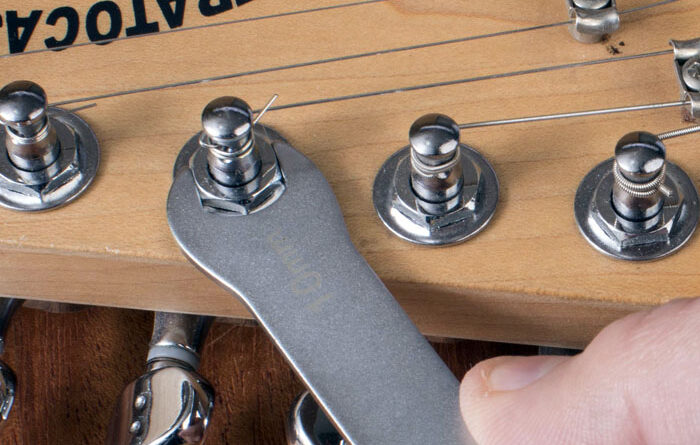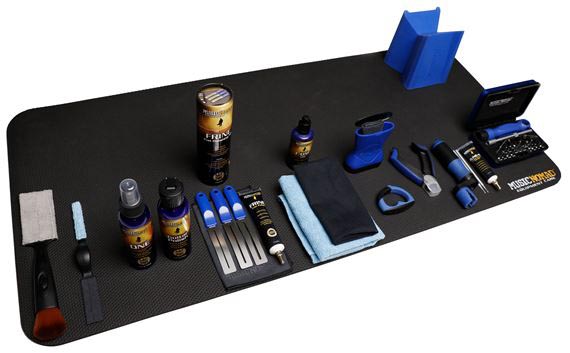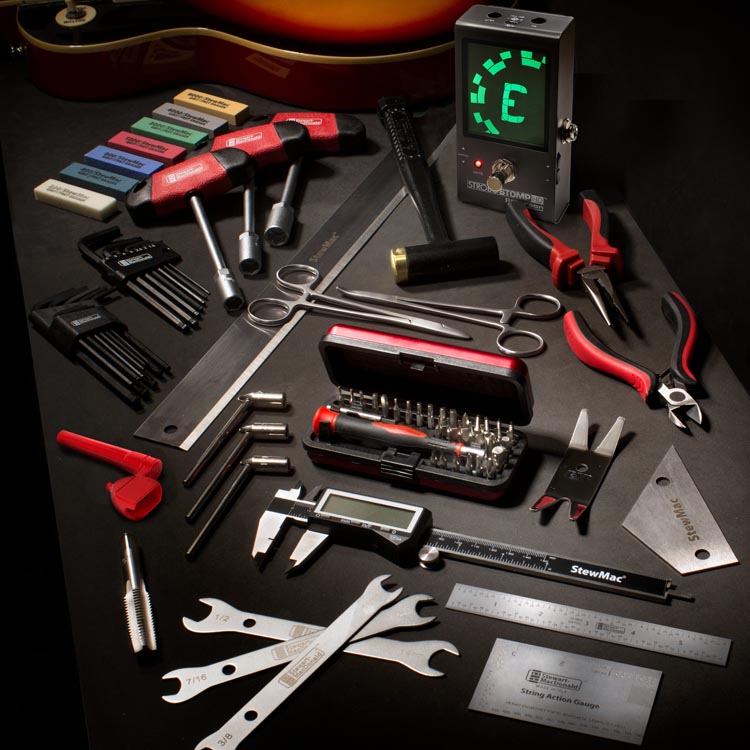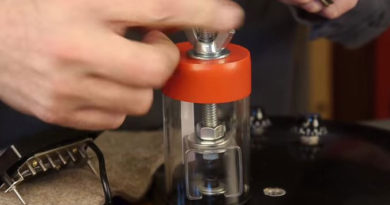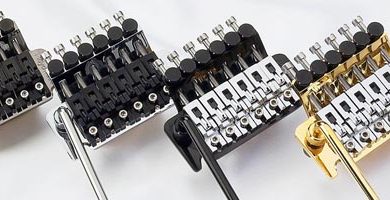Tech-know-logy: How to Find a Guitar Tech
You say you need to have some work done on your main axe? Something you don’t know how to do for yourself? That accounts for many players. Let’s look at how to find a guitar tech.
Guitar Tech or Luthier?
Why is that relevant? LOL! Good question! These days, it’s easy to see many people say they are taking their guitar to their luthier for “insert tech work here”.
Sounds simple, doesn’t it? A guitar technician is pretty much just that. Someone that is proficient at the technical maintenance and setup of a guitar. Oxford defines a luthier as “a maker of stringed instrument”. That suggests that a luthier can be a tech. But a tech might not be a luthier.
As such, taking your instrument to a lutheir for to install pickups might be overkill. Conversely, a tech might not be the best person to change a vintage style tremolo to a Floyd Rose system.
An actual bona fide luthier might command a higher fee as well. You can get what you pay for. But are you OK with over-paying?
How about we start with some basics?
What are you wanting to have done?
Upgrade to locking tuners? Install a Pure Tone output jack? Deal with some scratchy pots? Right off the bat, that level of stuff is fairly rudimentary and it will be good to land that in your wheelhouse. But it takes all kinds and not everyone is gifted with a mechanical inclination. So there are times when you just have to get it done by someone else.
Seasonal maintenance? Fret sprout? Radically different electronics wiring configuration? That is where things can, and will, take a turn on someone that doesn’t have a slightly more comprehensive knowledge base. Definitely worth erring to the side of caution on things such as these.
Crack or chip in the finish? Broken headstock? Fingerboard delamination? Installing hardware that requires modification to the wood? Fret installation? Did you buy something with polka dots or lightning bolts? It’s probably worth considering calling in the professionals to fix issues of this nature.
What to look for?
First and foremost, I suggest finding someone you can trust. You may or may not care if they are personable or if they are down-to-business. HaHa! But you can still serve yourself well by getting to know what they do and an idea of how they do it.
Here is a real-world example I’ve heard about. A guitar has frets that are higher than player’s preference. Goes to authorized service center wanting frets lowered, citing intonation issues with their style of play. Since customer uses low E string as an example, the shop literally files down frets under that single string. Not. Joking. Guitar taken to another shop and gives the shop the history of what’s happening. Instrument returned with all frets lowered to consistent level across the neck. Customer’s fingering style is complemented. And customer is happy.
How is their approach?
To build off that same example, how did the different shops handle the situation? In both instances, the player knows the fret dimensions of their favorite guitars and is asking for that spec “across the board” (literally! LOL!). The first shop is clearly only listening to the example of the problem. Whereas the second shop is focusing on the cause and how to meet the customer’s specific goal.
It’s helping that the customer knows what they want, and in a format that is helpful. In this instance, a micrometer, some calipers, or a nut slotting gauge can be helpful to know the exact size to tell the shop.

Does your input matter?
You bet it does! You might not be at a legit luthier level, but you know if something is working for you or not.
Let’s say you are new to wiring schematics. And you would like a single push-pull volume pot that can get two humbuckers to switch to parallel mode at the same time. Alas, gentle readers, that’s not something a single push/pull can manage. Trust me, I wish it were. HaHa! But at this point, does the shop offer options? Do they try to find out more about what you’re wanting to do and make an attempt to craft a solution that suits what you want?
Or to go back to the fret height example. Do you have specific info that is tried and true for your preference? Is the shop going to see that you have done your preparation? Or are they going to blow it out their exhaust port and do what they want to do? Trust me, if I’m doing my homework and know what I want, they aren’t getting return business if they chose to disregard my request.
Do they know how to work on your gear?
How about another example? Something that I see a lot of confusion about is the Floyd Rose tremolo system. It’s been around over 40 years. But players, techs, and even some supposed luthiers don’t know the score. The most common area is going to be the mounting posts and knife edges.
Many stores like to think they are doing the customer a favor by performing a “setup” on every guitar that comes in the door. Maybe a bit of a service, but also a little marketing. How many of those “setups” include loosening the tension on the bridge friction points before adjusting the action (string height)? That’s right! Turning those posts with the baseplate in contact can/will lead to dulling of the contact points that deteriorates tuning stability.
I can go in to a local store this very minute and guarantee it has at least one guitar with a Floyd that has tech-induced damage on the bridge contact points. I have also called online retailers to specifically ask their method. They literally cited learning from YouTube videos to do it that way. LOL! If only people would actually call the company. HaHa!
Yes, the Floyd Rose system is not as easy for many as the more traditional tremolo or as a fixed bridge. In this instance, it’s a more extreme example of the need to learn about what a prospective shop will be doing to your pride and glory.
What’s best for you?
Only you know that! But I can suggest what I look for. And what do I look for? A shop that I can trust.
How do you know you can trust the shop? These days, it should be easy to check around online and see what other customers have to say. But also develop your own instincts. Just start a conversation about what’s going on with your guitar and zone in on the vibe.
And be aware of the surroundings when you go to the shop. Does the person say they are just a tech, but have stacks of raw lumber and are clearly working on building instruments from scratch? Or do they say they are a luthier and all you see is a buffing wheel, a drill press, and a few hand tools? Both of those are things I’ve seen myself, and I tend to prefer the types that under-promise and over-deliver.
In conclusion
Being informed is always a good place to start. Maintain a few basic tools of your own. Things like a notched straight edge, a string action gauge, a fret rocker, and some of the other goodies in the Tech Tips section of this site. And then imagine you’re about to speak a foreign language in a different country. So knowing how to ask for the right item off the menu might keep your guitar from coming back with a case of Montezuma’s Revenge.. LOL!
7 string 16Ω 59 Airbucker Alnico 2 Alnico 4 Alnico 5 Alnico 8 Bare Knuckle BKP Boot Camp Brown Sound Celestion Ceramic Custom Shop David Shepherd DiMarzio Dual Resonance EVH Fishman Floyd Rose Fluence Gibson HSP90 Humbucker Ibanez JB Jimmy Page John Petrucci Les Paul MJ Mojotone P90 PAF Pariah Pickup Satch Seymour Duncan Singlecoil Single Width Speaker Steve Vai Tech Tip Tremolo Virtual Vintage

